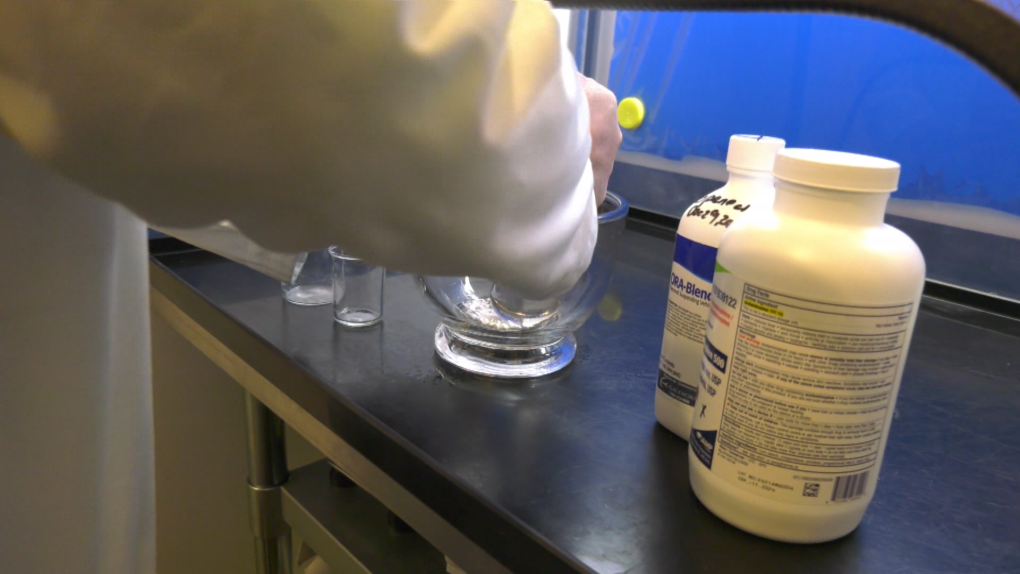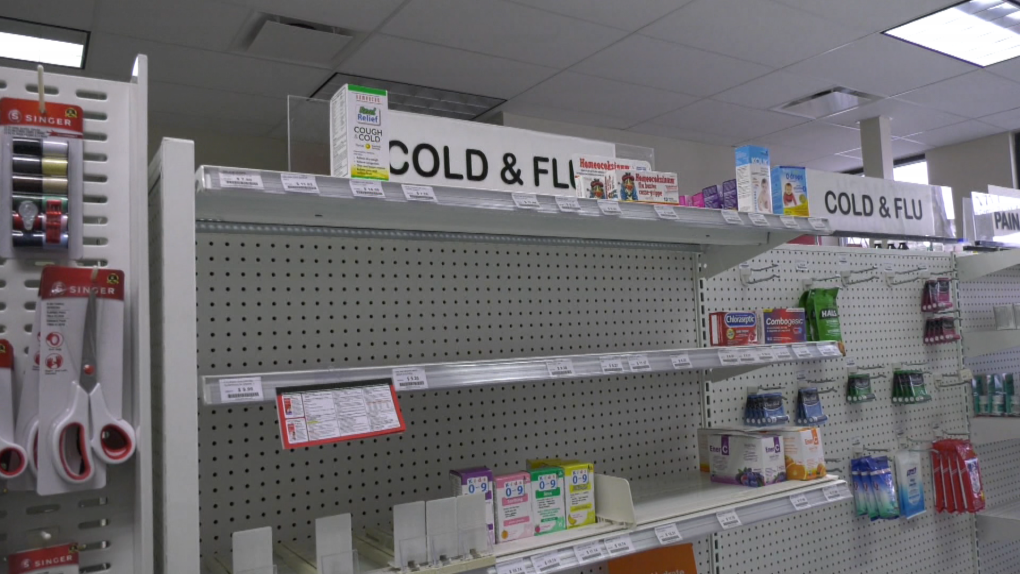'Big shortage of medications': Edmonton pharmacists struggle to fill prescriptions
Canadian parents have been dealing with shortages of children’s cold and pain medications for months, but some Edmonton pharmacists say shortages now extend to other medications, including some used to manage critical conditions.
Mohamed Elfishawi owns Terwillegar Pharmacy and says there are shortages of antibiotics and medications used to treat epilepsy and blood pressure, among other "essential" drugs.
“There is a big shortage of medications all over Canada. I don’t know what is the reason," he told CTV News Edmonton. "For some medication there is no alternatives.”
“I’ve been working for maybe now 20 years, and this is the first time there is this amount of shortages.”
He says he’s trying to manage his supply to ensure his patients get what they need.
“Instead of giving them three months like we usually do, we just give them maybe 10, 15 days at a time. Just asking them to bear with us until we get stock so we can help everybody.”
Elfishawi says customers are understandably frustrated.
“Some customers complain; sometimes they try to get their prescriptions somewhere else. I don’t blame them.”
“They come back and they say, ‘No, it’s all over, it’s everywhere.’”
It’s a similar story at Pure Care Pharmacy.
“They’re used to taking their medication, trying to meet treatment goals, then all of a sudden that medication they’ve been on and that they’re used to is no longer available,” said owner Diva Niaz.
“We have customers that are upset, and granted, it is understandable. You’re used to a certain treatment and now it’s being changed on you.”
Both pharmacies offer compounding services, making medications in-house from existing ingredients, but if those ingredients run short, patients are often forced to change again.
 Compounding medication.
Compounding medication.
A spokesperson for the Canadian Pharmacist Association says shortages are nothing new.
“They’ve been happening for as long as we can recall, and in fact, before the pandemic, we had reported that they had become an increasing problem with 79 per cent of pharmacists saying they’d become more important or grown in the last five years,” said Joelle Walker.
“The supply of drugs in Canada remains a really challenging issue for pharmacists to deal with.”
Walker says the Canadian drug market needs to be more appealing for drug manufacturers to sell their products so consumers will have more options.
“We've been working with the federal government for many years now trying to show how important this issue is for the Canadian public.”
 Cold and flu medication shortages at Terwillegar Pharmacy in Edmonton.
Cold and flu medication shortages at Terwillegar Pharmacy in Edmonton.
In response to a request for comment, Alberta Health Services released a written statement.
“Drug shortages can be caused by a variety of factors including global availability of active ingredients, manufacturing plant shut downs (planned and unplanned), unexpected changes in patient demand or other regulatory issues like patient safety concerns or product quality recalls."
“AHS reports no significant drug shortages in hospitals. If Albertan’s are unable to locate these medications, it is recommended that they speak to a pharmacist for assistance to see which alternative product may be available.”
Health Canada also responded with a written statement, saying it "works closely" with provinces, manufacturers and healthcare stakeholders to assess supply inventories and to "identify mitigation strategies."
“For more information about how Health Canada is addressing drug shortages in Canada and what to do if you believe your medication is in shortage, please visit the following website."
For information on how to view actual and anticipated shortages or discontinuations of specific drugs, visit Using the Drug Shortages Canada website.”
CTVNews.ca Top Stories

Quebec man, 81, gets prison sentence after admitting to killing wife with Alzheimer's disease
An 81-year-old Quebec man has been sentenced to prison after admitting to killing his wife with Alzheimer's disease.
Canada Post quarterly loss tops $300M as strike hits second week -- and rivals step in
Canada Post saw hundreds of millions of dollars drain out of its coffers last quarter, due largely to its dwindling share of the parcels market, while an ongoing strike continues to batter its bottom line.
'Immoral depravity': Two men convicted in case of frozen migrant family in Manitoba
A jury has found two men guilty on human smuggling charges in a case where a family from India froze to death in Manitoba while trying to walk across the Canada-U.S. border.
Pat King found guilty of mischief for role in 'Freedom Convoy'
Pat King, one of the most prominent figures of the 2022 'Freedom Convoy' in Ottawa, has been found guilty on five counts including mischief and disobeying a court order.
Trump supporters review-bomb B.C. floral shop by accident
A small business owner from B.C.’s Fraser Valley is speaking out after being review-bombed by confused supporters of U.S. president-elect Donald Trump this week.
Nearly 46,000 electric vehicles recalled in Canada over potential power loss
Nearly 46,000 electric vehicles from Kia, Hyundai and Genesis are being recalled in Canada over a potential power loss issue that can increase the risk of a crash.
Canada's tax relief plan: Who gets a cheque?
The Canadian government has unveiled its plans for a sweeping GST/HST pause on select items during the holiday period. The day after the announcement, questions remain on how the whole thing will work.
Grey Cup streaker fined $10K, banned from BC Place
The woman who ran across the field wearing nothing but her shoes at last weekend’s Grey Cup has been given a fine and banned from BC Place.
U.S. court tosses hostile workplace, pay discrimination claims against BlackBerry
A U.S. court has closed the door on "hostile work environment" and wage discrimination claims made by a former BlackBerry Ltd. executive who accused the company's CEO of sexually harassing her and then retaliating against her when she reported the behaviour.


































